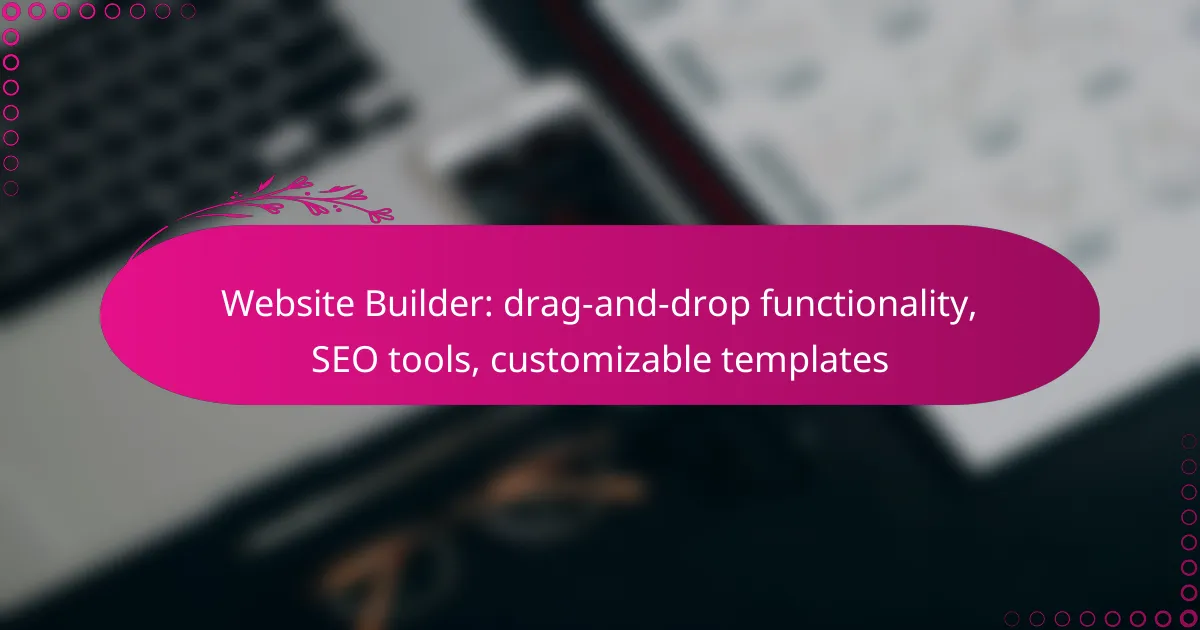Website builders with drag-and-drop functionality empower users to effortlessly create and customize their websites without any coding knowledge. With integrated SEO tools, these platforms enhance visibility on search engines, helping users optimize content and analyze performance. Additionally, a wide range of customizable templates allows for visually appealing designs, making it simple to establish a professional online presence.

What are the best website builders with drag-and-drop functionality in Canada?
Several website builders in Canada offer drag-and-drop functionality, making it easy for users to create and customize their sites without coding. Popular options include Wix, Squarespace, Weebly, WordPress.com, and Shopify, each with unique features tailored to different needs.
Wix
Wix is renowned for its intuitive drag-and-drop interface, allowing users to design websites effortlessly. It offers a wide range of customizable templates and a robust app market for added functionality.
Consider Wix if you value flexibility in design and a large selection of apps. However, be mindful that some advanced features may require a premium plan, which can range from CAD 10 to CAD 50 monthly.
Squarespace
Squarespace combines drag-and-drop ease with visually stunning templates, ideal for creatives and businesses focused on aesthetics. Its built-in SEO tools help enhance your site’s visibility without needing extensive technical knowledge.
While Squarespace is user-friendly, its pricing starts at around CAD 16 per month, and it may not offer as many third-party integrations as other platforms. Evaluate your design needs and budget before committing.
Weebly
Weebly is a straightforward website builder that provides a simple drag-and-drop interface, making it suitable for beginners. It includes essential SEO tools and e-commerce features, allowing users to set up online stores easily.
Weebly’s pricing is competitive, starting at approximately CAD 6 per month. However, its design flexibility may be more limited compared to Wix or Squarespace, so consider your customization needs.
WordPress.com
WordPress.com offers a drag-and-drop editor through its Gutenberg block editor, making it accessible for users with varying skill levels. It provides extensive customization options and a vast library of plugins for enhanced functionality.
Keep in mind that while WordPress.com has a free tier, premium features and custom domains typically require a subscription starting around CAD 4 monthly. Assess your long-term goals to choose the right plan.
Shopify
Shopify is specifically designed for e-commerce, featuring a user-friendly drag-and-drop interface that simplifies online store creation. It includes powerful SEO tools and customizable templates tailored for selling products online.
Shopify’s pricing starts at about CAD 39 per month, which includes hosting and security features. If you plan to run an online store, consider the transaction fees and payment gateway options available to ensure they align with your business model.

How do SEO tools enhance website builders?
SEO tools significantly enhance website builders by providing essential features that improve a site’s visibility on search engines. These tools help users optimize their content, manage metadata, and analyze performance, making it easier to attract and retain visitors.
Keyword optimization features
Keyword optimization features allow users to identify and incorporate relevant keywords into their website content. By using tools that suggest keywords based on search volume and competition, users can tailor their content to align with what potential visitors are searching for. This can lead to higher rankings in search engine results pages (SERPs).
Many website builders offer keyword tracking and analysis tools, which can help users monitor the effectiveness of their chosen keywords over time. Regularly updating content with high-performing keywords can significantly enhance organic traffic.
Meta tag management
Meta tag management is crucial for informing search engines about the content of a webpage. SEO tools within website builders typically allow users to easily edit title tags and meta descriptions, ensuring they are optimized for both search engines and users. A well-crafted meta description can improve click-through rates from search results.
It’s advisable to keep title tags under 60 characters and meta descriptions under 160 characters to ensure they display properly in search results. Regularly reviewing and updating these tags can help maintain relevance as trends change.
Analytics integration
Analytics integration enables users to track website performance and user behavior effectively. By connecting tools like Google Analytics, website builders can provide insights into traffic sources, user engagement, and conversion rates. This data is vital for making informed decisions about content and marketing strategies.
Users should regularly review analytics reports to identify which pages perform well and which need improvement. Setting up goals within analytics can help measure the effectiveness of specific campaigns or content changes.
Mobile optimization tools
Mobile optimization tools ensure that websites are responsive and user-friendly on mobile devices. With a growing number of users accessing websites via smartphones, having a mobile-optimized site is essential for SEO. Many website builders include features that automatically adjust layouts and images for different screen sizes.
Testing a website’s mobile performance using tools like Google’s Mobile-Friendly Test can provide valuable feedback. Users should prioritize fast loading times and easy navigation to enhance the mobile user experience, which can positively impact search rankings.

What customizable templates are available for website builders?
Website builders offer a variety of customizable templates that cater to different needs and aesthetics. These templates allow users to create visually appealing websites without needing extensive design skills, making it easier to establish an online presence.
Wix templates
Wix provides hundreds of customizable templates across various categories, including business, portfolio, and online store designs. Users can easily modify layouts, colors, and fonts using the drag-and-drop editor, allowing for a personalized touch. Additionally, Wix templates are mobile-responsive, ensuring that websites look great on all devices.
Squarespace templates
Squarespace offers a selection of elegant, professionally designed templates that are particularly popular among creatives and small businesses. Each template is highly customizable, with options for adjusting styles and layouts to fit brand identities. Squarespace also emphasizes visual storytelling, making it ideal for portfolios and blogs.
Shopify themes
Shopify features a range of themes specifically designed for e-commerce, allowing users to create online stores with ease. These themes can be customized to reflect a brand’s unique style while optimizing for sales conversions. Shopify themes also include built-in SEO features and payment gateway integrations, enhancing the overall shopping experience.
WordPress themes
WordPress offers thousands of themes, both free and premium, catering to various niches and functionalities. Users can customize these themes extensively through the WordPress Customizer or page builder plugins. It’s essential to choose a theme that is regularly updated and compatible with essential plugins to ensure optimal performance and security.

What are the pricing plans for popular website builders in Canada?
Popular website builders in Canada offer a variety of pricing plans that cater to different needs, ranging from basic to advanced features. Typically, these plans include monthly or annual subscriptions, with costs varying based on the level of functionality, storage, and support provided.
Wix pricing
Wix offers several pricing tiers, starting with a free plan that includes Wix branding. Paid plans range from approximately CAD 14 to CAD 49 per month, depending on features such as e-commerce capabilities, storage limits, and additional tools like SEO and analytics. For businesses looking to sell online, the Business and eCommerce plans are essential, starting at around CAD 23 per month.
When selecting a plan, consider your specific needs, such as whether you require a custom domain or advanced marketing tools. Be aware of the renewal rates, as they may differ from the initial promotional pricing.
Squarespace pricing
Squarespace offers four main pricing plans, starting at about CAD 16 per month for personal use and going up to CAD 54 per month for advanced e-commerce features. Each plan includes a free custom domain for the first year and access to various templates and design tools. The Business plan, priced around CAD 23 per month, is suitable for small businesses looking to integrate e-commerce.
Consider the features included in each plan, such as SEO tools and analytics, which can significantly impact your website’s performance. It’s advisable to evaluate your long-term goals to choose the most suitable plan.
Shopify pricing
Shopify is tailored for e-commerce and offers three primary pricing plans: Basic Shopify at approximately CAD 39 per month, Shopify at around CAD 105 per month, and Advanced Shopify at about CAD 399 per month. Each plan includes features like online store capabilities, payment processing, and customer support, with higher tiers offering advanced reporting and shipping discounts.
When choosing a Shopify plan, assess your business size and sales volume. The Basic plan is suitable for startups, while larger businesses may benefit from the additional features of the higher tiers. Keep in mind that transaction fees may apply unless you use Shopify Payments.

What integrations do website builders offer?
Website builders typically offer a variety of integrations to enhance functionality, including tools for email marketing, social media, and analytics. These integrations allow users to streamline their online presence and improve engagement with their audience.
Email marketing tools
Email marketing tools integrated into website builders enable users to create and manage email campaigns directly from their site. Popular options include Mailchimp, Constant Contact, and Sendinblue, which provide features like automated responses, list segmentation, and performance tracking.
When choosing an email marketing tool, consider factors such as ease of use, pricing, and compatibility with your website platform. Many builders offer built-in options or easy integrations, allowing you to start collecting email addresses and sending newsletters quickly.
Social media integrations
Social media integrations allow website builders to connect your site with platforms like Facebook, Twitter, and Instagram. These integrations facilitate sharing content directly from your website and embedding social feeds, which can enhance user engagement and increase traffic.
To maximize the benefits of social media integrations, ensure that your website includes social sharing buttons and links to your profiles. Additionally, consider using tools that allow for automatic posting of new content to your social channels, keeping your audience updated without extra effort.
